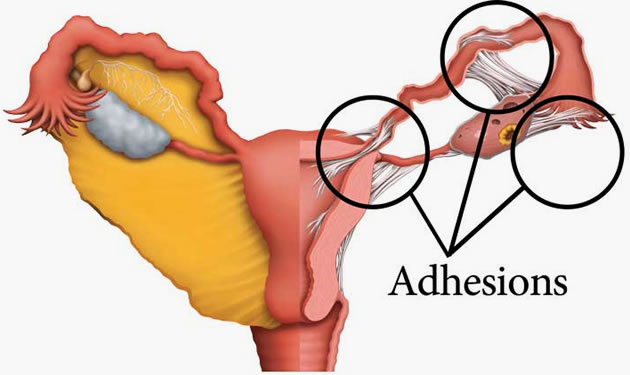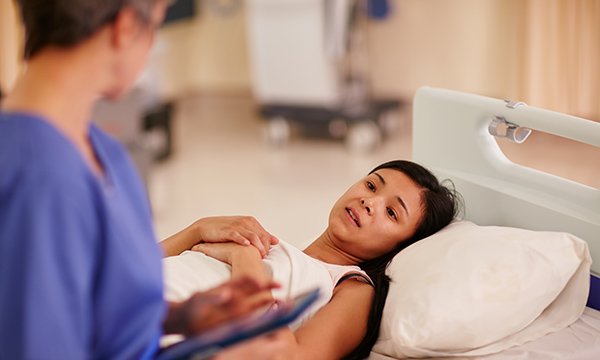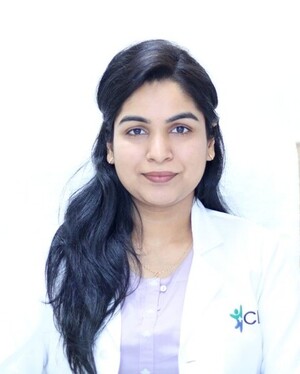What Are Adhesions?
Adhesions are bands of scar or fibrous tissue that can form inside the body. It can join the two internal body surfaces that are not usually connected.
Adhesions can develop in the body when it tries to repair itself or respond to any tissue disturbance, or else when tissues in the body become inflamed, injured, or after surgery. It can appear as thin sheets of tissue and can form anywhere, but the most common locations of adhesions are within the abdominal cavity, the pelvis, the female reproductive organs, and the heart.

These bands of scar tissues can occur between organs within the abdomen, such as the uterus, ovaries, and fallopian tubes, for several reasons that are discussed below:
- Adhesions can form from previous abdominal or pelvic surgeries.
- Infections such as pelvic inflammatory disease (PID), sexually transmitted infections (STIs) or conditions like endometriosis can also lead to adhesions.
- Any traumatic events like accidents or injuries that involve the abdomen and pelvis may also lead to the development of adhesions.
The development of adhesions in the body can lead to pain, discomfort, and complications such as infertility by limiting and blocking the movement and function of the affected organs. Causes of adhesions can vary from individual to individual and can be because of various genetic or individual factors.
To help treat and manage the pain and discomfort from the adhesions, surgical procedures and other medical approaches are available. Surgical approaches for adhesion removal help relieve the pain from the adhesions and restore the proper functioning of the affected organs.
What is Laparoscopic Adhesiolysis?
Laparoscopic adhesiolysis is a surgical procedure that is performed for the removal of adhesions in the abdominal cavity, particularly in the vicinity of the ovaries, womb (uterus), and cervix.
It is also known as a minimally invasive, keyhole surgery for the removal of adhesions.
First, the patient is typically placed under general anaesthesia. Instead of a large abdominal incision, small incisions (usually 0.5 to 1 centimetre in size) are made in the lower abdomen. These incisions are used for the insertion of specialized surgical instruments and a laparoscope.

A laparoscope is a medical instrument that has a thin, flexible tube-like structure with a camera and light at the end. The laparoscope allows the surgeon to view the pelvic area on a monitor in real time, providing a clear and magnified image of the internal organs. During the procedure, surgeons gently cut, release, or remove the adhesions using specialised instruments.
Once the adhesions are successfully treated, the instruments are removed, and the incisions are closed with sutures or adhesive strips.
What To Expect After the Procedure?
After undergoing laparoscopic adhesiolysis, you may experience some pain and discomfort at the operating location. For that, your doctor will give you pain medication to help alleviate the discomfort. You may be allowed to go home the same day as the procedure, or after a short hospital stay, depending on the situation.

Get Laparoscopic Adhesiolysis by Dr. Disha Verman
Adhesiolysis is a surgical procedure used to break or remove adhesions in the body. These adhesions can cause pain, infertility, and other gynaecological issues by restricting the movement of reproductive organs. Laparoscopic adhesiolysis offers several benefits over traditional surgery including minimal scarring, reduced postoperative pain, shorter hospital stay, and faster recovery time.
To help alleviate the pain and discomfort, consult Dr. Disha Verman, a skilled OB-GYN and trained laparoscopic surgeon in Mathura, Uttar Pradesh.

Dr Disha Verman
Contact us
Make an Appointment
Contact
+ 91 9760070333
Location
Verman Hospital,Sadar Road,Mathura,281001
